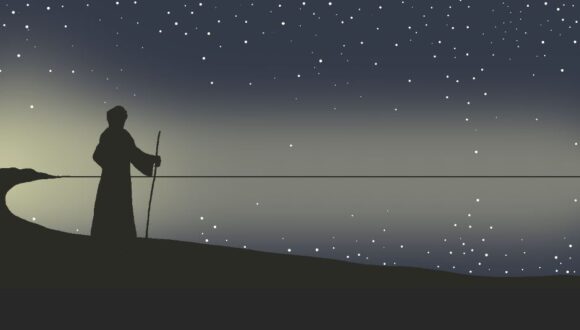WE KNOW VERY LITTLE about his early life, but much about his later life. He is revered by Jews, Muslims and Christians. The Jews trace their ancestry back to Abraham and regard him as their father.
We first meet him in Genesis 11:28 as Abram (before his name was changed). He was a rich man living in Ur, a city in modern Iraq. Archaeologists inform us that the inhabitants of Ur were advanced and sophisticated. Abram would be schooled in mathematics and astronomy, and he would have lived in a comfortable brickbuilt house. If he was a merchant he would have possessed his own private army to protect his business interests.
His family worshipped the gods of Ur, but Abram and his wife Sarai appear to have been different, worshipping the true God.
The Promises
In Genesis 12:1 we see God’s call to Abram to leave his life in Ur and travel to another country, which God did not name. They were an elderly couple (Abram was 70). How would he feel to be chosen like this? It must have been a challenge, but as a faithful man he obeyed. He took his household, including his nephew Lot and his family, and set off into the unknown.
The New Testament Letter to the Hebrews describes Abram’s journey: “By faith Abraham obeyed when he was called to go out to the place which he would receive as an inheritance. And he went out, not knowing where he was going” (Hebrews 11:8).
God made some amazing promises to Abram, which were so important that they are repeated several times in the Bible. They changed his life and the whole course of history:
I will make you a great nation; I will bless you and make your name great; and you shall be a blessing. I will bless those who bless you, and I will curse him who curses you; and in you all the families of the earth shall be blessed (Genesis 12:2–3).
They came to the land of Canaan. “Then the Lord appeared to Abram and said, ‘To your descendants I will give this land.’ And there he built an altar to the Lord” (Genesis 12:7).
Driven by a severe famine in Canaan he journeyed to Egypt, where he had a test of his faith. God delivered him out of danger, and he returned to Canaan.
So far the family had kept together. But because of the vast numbers of their livestock “the land was not able to support them” (Genesis 13:6) and they needed to separate. Here we see the kindness and humility of Abram, as he invited Lot to choose which way he wanted to go. “And Lot lifted his eyes and saw all the plain of Jordan, that it was well watered everywhere”. But the people who lived there “were exceedingly wicked and sinful against the Lord” (verse 13). It’s appropriate that Lot’s name means ‘veiled eyes’.
Lot headed for the plain and Abram headed for the hills. Lot had lifted his eyes and been beguiled by the lushness of the valley. Now God invited Abram: “Lift your eyes now and look from the place where you are—northward, southward, eastward, and westward; for all the land which you see I give to you and your descendants forever. And I will make your descendants as the dust of the earth; so that if a man could number the dust of the earth, then your descendants also could be numbered. Arise, walk in the land through its length and its width, for I give it to you” (verses 14–17).
Chapter 14 relates an invasion of the land, during which Lot and his family were taken captive. Abram pursued the invaders with his household army and rescued his nephew. There followed a momentous meeting with another worshipper of God, Melchizedek the king of Salem. The Letter to the Hebrews points out the prophetic significance of this meeting (chapter 7). That’s another subject.
Abram was now 85 years old. God had promised him descendants, but he and Sarai were too old to have children. Chapter 15 opens with God’s promise that He would give them a son. It must have seemed impossible, but “he believed in the Lord” (verse 6). This was what marked Abram out—he believed what God told him. The verse tells us that God “accounted it to him for righteousness”.
The Apostle Paul discusses this episode in his Letter to the Romans. Nobody is righteous in God’s eyes—but if we show faith like Abraham, God will account our faith as righteousness (Romans 4:16–25).
Names Changed
Genesis 16. Abram had waited faithfully for many years, but he had no heir. At last he took the matter into his own hands and had a son by Sarah’s maid Hagar. But in chapter 18 God visited him and assured him that His promises would be fulfilled by a son of Sarah. And sure enough, by a miracle she had a son, whom they called Isaac. Abram was now 99 years old.
In chapter 17 God changed Abram’s name to Abraham (‘Father of a Multitude’), and Sarai’s name to Sarah (‘Princess’). They had waited so long for Isaac. All God’s promises depended on him. But in chapter 22 came Abraham’s biggest test of faith. God told him to offer Isaac as a burnt offering! Imagine Abraham’s grief. But as always he obeyed.
Again, the Letter to the Hebrews contains a commentary on this: “By faith Abraham, when he was tested, offered up Isaac, and he who had received the promises offered up his only begotten son, of whom it was said, ‘In Isaac your seed shall be called,’ concluding that God was able to raise him up, even from the dead, from which he also received him in a figurative sense” (Hebrews 11:17–19). Abraham trusted God’s promises completely, so he believed that even if Isaac died God would bring him back to life.
In the event God did not allow Abraham to harm his son. But witnessing his tremendous faith, God declared: “By Myself I have sworn, says the Lord, because you have done this thing, and have not withheld your son, your only son—blessing I will bless you, and multiplying I will multiply your descendants as the stars of the heaven and as the sand which is on the seashore; and your descendants shall possess the gate of their enemies. In your seed all the nations of the earth shall be blessed, because you have obeyed My voice” (Genesis 22:16–18).
Abraham’s Faith
God keeps His promises. Abraham did become the father of a great nation, which possessed the land of Canaan. And Bible prophecies describe the Kingdom of God, when Israel will be the centre of a worldwide kingdom and Abraham himself will be there to see it (for example Matthew 8:11).
But God’s promises concerned more than the nation. The Apostle Paul brings out a deeper significance to that last great promise God made: “Now to Abraham and his Seed were the promises made. He does not say, ‘And to seeds,’ as of many, but as of one, ‘And to your Seed,’ who is Christ” (Galatians 3:16). It is Jesus Christ who is the ultimate fulfilment of all the promises God made to Abraham. He gave his life as a sacrifice to bring us to God, and it is he who will rule in the Kingdom and bring blessings to all the earth.
Remember that what really marked Abraham out and endeared him to God was his faith. That’s where you and I come in. We don’t need to be literal descendants of Abraham—we just need to share Abraham’s faith in the things that God tells us.
For you are all sons of God through faith in Christ Jesus. For as many of you as were baptized into Christ have put on Christ. There is neither Jew nor Greek, there is neither slave nor free, there is neither male nor female; for you are all one in Christ Jesus. And if you are Christ’s, then you are Abraham’s seed, and heirs according to the promise (Galatians 3:26–29).
Tom Ingham




